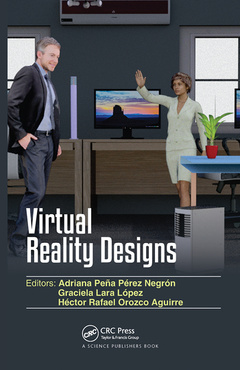Virtual Reality Designs
Coordonnateurs : Negrón Adriana Peña Pérez, López Graciela Lara, Aguirre Héctor Rafael Orozco

Virtual Reality is not real life. Instead it is life-like creations using computer-generated scenarios. Human behavior is replicated in virtual scenarios, where every detail is controlled by computers, and in situations that can be repeated under the same conditions.
Based on technology and design, the user can experience presence. In the virtual world, users are embodied in avatars that represent them and are the means to interact with the virtual environment. Avatars are graphical models that behave on behalf of the human behind them. The user avatar is a proxy that also backs interaction with others, allowing computer-mediated interactions.
Analyses directed to understand people?s perceptions, personal and social behavior in computer mediated interactions, comprise a multidisciplinary area of study that involves, among others, computer science, psychology and sociology. In the last two decades a number of studies supported by Virtual Reality have been conducted to understand human behavior, in some cases the implications of the technology, or to reproduce artificial human behavior. This book presents a collection of studies from recognized researchers in the area.
Virtual reality as a tool for behavior analysis and applications. Navigating in Virtual Reality. User modeling systems adapted to virtual environments. Synthetic Perception and Decision-Making for Autonomous Virtual Humans in Virtual Reality Applications. An internal model for characters in Virtual Environments: emotion, mood and personality. Pedagogical agents as virtual tutors: applications and future trends in Intelligent Tutoring Systems and Virtual Learning Environments. Gamification in Virtual Reality Environments for the integration of highly effective teams. Integrating Virtual Reality into Learning-Objects based courses. Virtual simulation of road traffic based on Multi-agent systems. The sense of touch as the last frontier in Virtual Reality technology.
Adriana Peña Pérez Negrón received her doctoral degree cum laude in Informatics Engineering from the Universidad Politécnica de Madrid, Spain. Currently, she is a researcher professor at the Universidad de Guadalajara, Mexico. Her main areas of interest are virtual reality, mainly on its application for teamwork, and gamification.
Graciela Lara López received her Ph.D. in Software and Systems in 2016 from the Universidad Politécnica de Madrid, Spain. A Master in Information Systems in 2003 and Degree in Computer Science in 2000 from the Universidad de Guadalajara. Her areas of interest are in virtual reality, mainly on its application for training, 3D object modeling, and spatial mental models. She is an associate professor at the Computer Science Department of the Universidad de Guadalajara, Mexico.
Hécor Rafael Orozco Aguirre is a full-time professor Autonomous University of Mexico State, Mexico. In 2011, he was awarded by the Mexican Society of Artificial Intelligence to the Third Best Doctoral Thesis nationwide. Currently, he works on Research Projects related to Simulation of Crime Prediction and Anticipation Strategies for its Control and Reduction, Virtual Tutors for the Improvement of Educational Teaching, as well as Analysis, Modeling, and Simulation of Vehicle Traffic and Pedestrian Behavior.
Date de parution : 06-2021
15.6x23.4 cm
Date de parution : 03-2020
15.6x23.4 cm
Thèmes de Virtual Reality Designs :
Mots-clés :
Intelligent Virtual Agent; Exploring human conduct in virtual reality; SMA Wire; Humans conducting themselves while operating digital technology; Pedagogical Agents; Adapting virtual worlds to human attitudes and vice versa; De Aguascalientes; OCC; Navigation Training; Vice Versa; IOS; Team Software Process; VE; Rube Goldberg Machine; Game Controller; Virtual Humans; Pad Model; Virtual Tutor; Gamification Elements; Standard SCORM; Dynamic Virtual Environments; Membership Functions; Virtual Reality Environment; Dlr German Aerospace Center; Fuzzy Sets; User Ontology; Hemi-spatial Neglect; UCD


